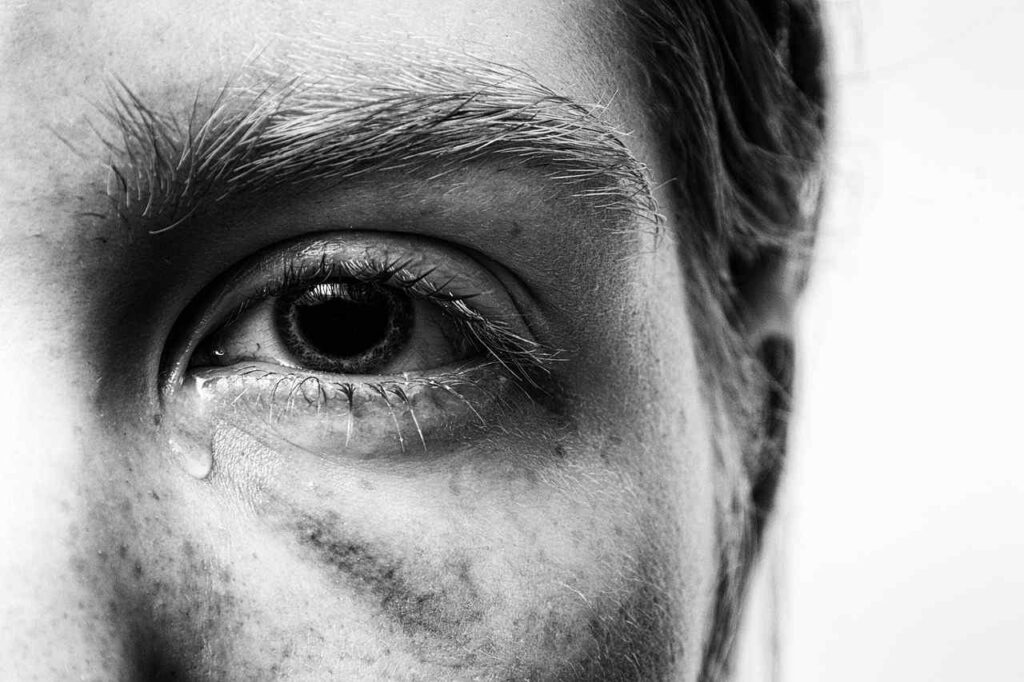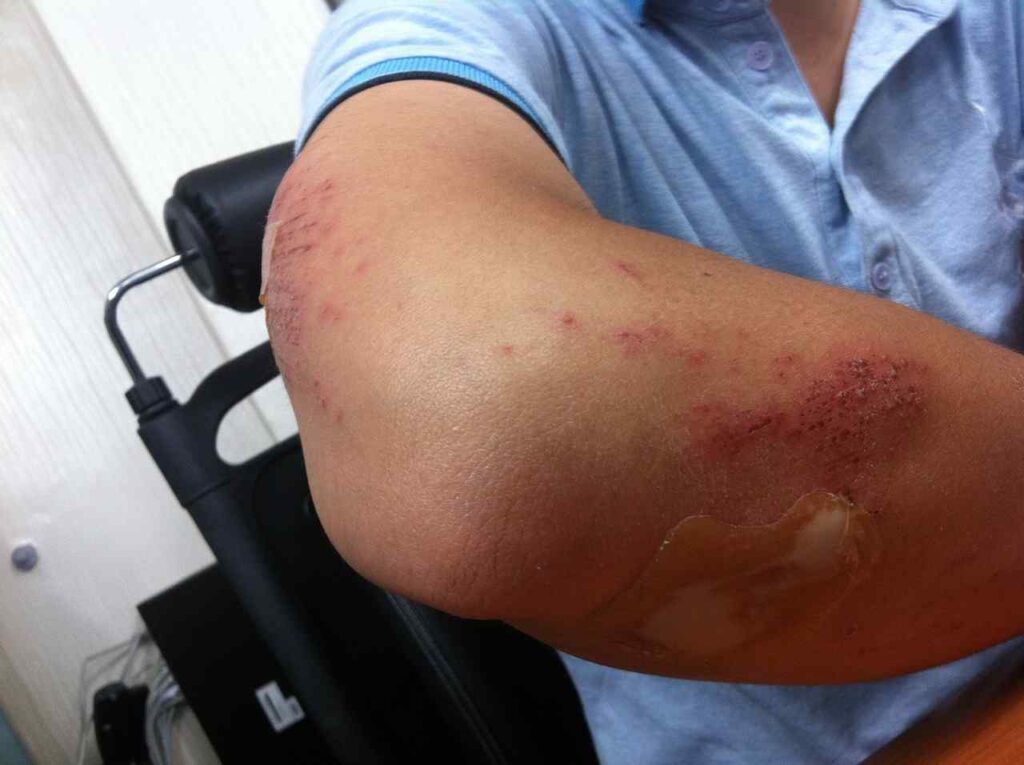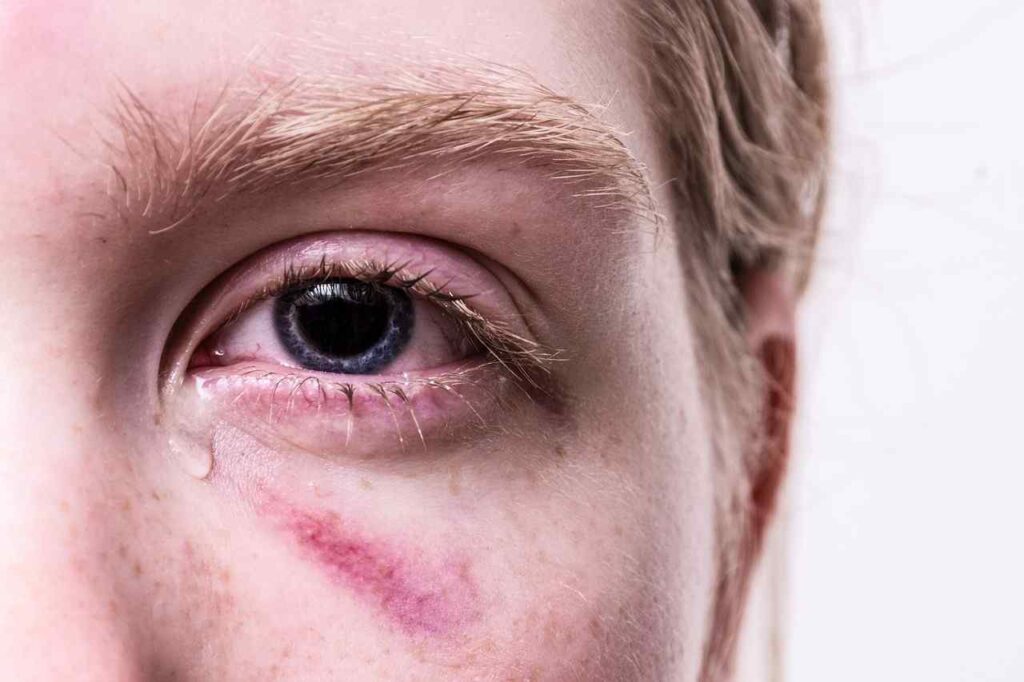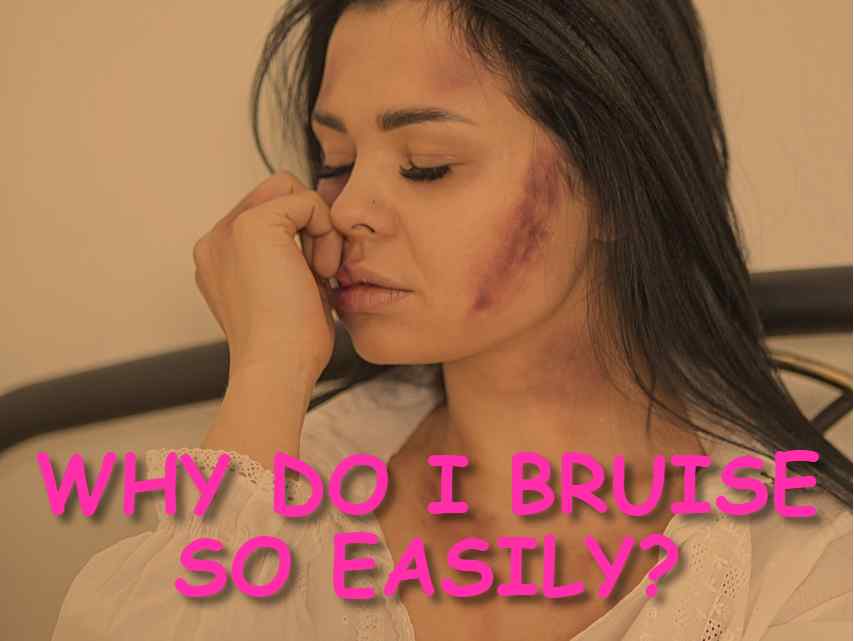Table of Contents
Have you ever wondered why you seem to bruise easily? Maybe you just bumped into a piece of furniture or you don't remember bruising yourself at all – but suddenly you notice a large, painful bruise on your skin. This can often be concerning, especially if it happens frequently or for no apparent reason. In this article, we will explore the causes of easy bruising, ways to diagnose it and possible treatment options.
What is bruising and why do people bruise?
How do bruises form?
A bruise, also known as a contusion, is a mark that occurs when blood vessels beneath the skin's surface are damaged. This leads to bleeding, which can cause the skin to appear reddish-purple or blue and become tender or painful to the touch. Bruises can occur anywhere on the body, but they are most common on the arms or legs.
What is the underlying mechanism of bruising?
The underlying mechanism of bruising is related to blood clotting. When blood vessels are damaged, platelets form a clot to stop the bleeding. Over time, the body will reabsorb the blood that was leaked from the wound, which is why bruises will change color as they heal.
What are the types of bruises?
There are several types of bruises, including petechiae, purpura, and ecchymosis. Petechiae are small red or purple dots that appear on the skin and are caused by broken blood vessels. Purpura is a larger bruise that is often associated with bleeding disorders or the use of blood thinners. Ecchymosis is the common bruise that is caused by trauma.

What causes easy bruising?
What health conditions can cause easy bruising?
There are many health conditions that can cause easy bruising. Hemophilia and von Willebrand disease are two bleeding disorders that affect the body's ability to clot blood properly. Certain vitamin deficiencies, such as vitamin C and vitamin K, can also lead to easy bruising. Additionally, some cancers, such as leukemia, can cause easy bruising due to abnormal blood cell counts.
Which medications can cause easy bruising?
Some types of medication can also cause easy bruising. Blood thinners, such as warfarin, can cause bruises to form more easily. Aspirin and non-steroidal anti-inflammatory drugs (NSAIDs), such as ibuprofen, can also impact the body's ability to clot blood. Steroids can also cause thinning of the skin, which can make it more prone to bruising.
What are the possible deficiencies that cause easy bruising?
In addition to vitamin C and vitamin K, deficiencies in vitamin B12 and vitamin E can also cause easy bruising. These vitamins are essential to healthy skin and blood vessel walls, and their absence can lead to a tendency to bruise.

How is easy bruising diagnosed?
What are the diagnostic methods for easy bruising?
The diagnosis of easy bruising is largely based on a physical examination and medical history. Your doctor may ask questions about your health, any medications you are taking, and your symptoms. They may also perform a blood test to check your platelet levels and ability to clot blood.
What are the criteria for diagnosing easy bruising?
The criteria for diagnosing easy bruising vary depending on the underlying cause and the individual's medical history. Generally, easy bruising may be diagnosed if the individual bruises significantly more easily than usual or tends to bruise for no apparent reason.
What tests should be done to identify the underlying cause of easy bruising?
Tests to identify the underlying cause of easy bruising may include a complete blood count, blood chemistry tests, and evaluation of platelet function. Depending on the suspected cause, additional tests, such as genetic testing or a bone marrow biopsy, may be necessary.

What are the possible treatment options for easy bruising?
What lifestyle changes can help improve easy bruising?
Lifestyle changes may help improve easy bruising. This includes wearing protective clothing or gear when participating in activities that may cause injury, such as sports or manual labor. Eating a balanced diet that includes plenty of fruits and vegetables can also help improve the overall health and resilience of the skin.
What medications can be used to treat easy bruising?
Medications used to treat easy bruising may include those that increase platelet levels or improve the body's ability to clot blood. For example, medications such as tranexamic acid or aminocaproic acid may be used to control bleeding disorders. Additionally, topical creams or gels containing vitamin K may help decrease the appearance of bruises.
What are the alternative therapies for treating easy bruising?
Alternative therapies for treating easy bruising include the use of herbs such as arnica or bromelain. These have been shown to help reduce swelling and bruising when applied topically. However, it is important to note that the effectiveness of these treatments is not well-supported by scientific research, and they may not work for everyone.

How to prevent easy bruising?
What preventive measures can one take to avoid easy bruising?
Preventive measures to avoid easy bruising include wearing protective gear when participating in activities that may cause injury, such as cycling or skiing. Additionally, it's important to stay hydrated and avoid alcohol, which can thin the blood and increase the risk of bruising.
What dietary changes can one make to prevent easy bruising?
Making dietary changes can also help prevent easy bruising. Eating a balanced diet that includes plenty of fruits and vegetables can provide the body with the necessary vitamins and nutrients to maintain healthy skin and blood vessel walls.
What exercises can help one prevent easy bruising?
Exercises that promote balance, such as yoga or tai chi, can help improve circulation and reduce the risk of falls that may lead to bruising. Additionally, strength training can help improve overall muscle function and stability.
In conclusion, easy bruising can be concerning and uncomfortable. However, it's important to understand the possible causes and treatment options to find relief. If you notice that you bruise frequently or for no apparent reason, it's a good idea to speak with your doctor to learn about possible underlying conditions and ways to reduce your risk of bruising.

Frequently Asked Questions About Why Do I Bruise So Easily?
Q: Why do I bruise easily?
A: Bruising easily is a common condition, especially as you get older. When you bruise, small blood vessels under the skin are broken and cause blood to leak into the surrounding tissue, creating the dark and often unexplained marks we see on our skin.
Some people may bruise more easily than others due to a variety of factors, including genetics, vitamin deficiencies, or a low platelet count. If you’re concerned about your bruising, it’s important to speak with a healthcare provider to determine the underlying cause.
Q: What causes bruising?
A: Bruising is most commonly caused by the small blood vessels under the skin breaking and leaking blood into the surrounding tissue. This can happen for a variety of reasons, including injury, aging, certain medications, or underlying health conditions that affect blood clotting or the strength of blood vessels.
Q: What are some specific causes of bruising?
A: Some specific underlying causes of bruising may include a vitamin deficiency, such as a lack of vitamin C, vitamin K, or folate; a bleeding disorder, such as hemophilia or von Willebrand disease; or a low platelet count, which can affect clotting ability. Additionally, certain medications, such as blood thinners or steroids, can increase your risk of bruising.
Q: Is bruising easily a cause for concern?
A: In most cases, bruising easily isn’t a cause for concern and is simply a natural result of aging and normal wear and tear on the body. However, if you begin to notice large bruises or frequent unexplained bruising, it may be worth discussing with a healthcare provider to ensure that there isn’t an underlying health condition contributing to the issue.
Q: Can bumping into something cause a bruise?
A: Yes, bumping into an object or being struck by an object can cause a bruise. This is because the impact can cause small blood vessels under the surface of the skin to break, resulting in blood leaking into the surrounding tissue and causing a bruise to form.
Q: How can I prevent bruising?
A: While it’s difficult to completely prevent bruising, especially as you get older, there are some steps you can take to minimize your risk. These may include wearing protective gear when engaging in sports or other physical activity, avoiding medications that can increase your risk of bruising, and ensuring that you are consuming a healthy diet that is rich in vitamins and minerals that support healthy blood vessels and blood clotting.
Q: Are there any treatments for bruising?
A: In most cases, bruises will gradually fade and disappear on their own without medical treatment. However, you can take some steps to speed up the healing process, such as applying a cold compress to the bruised area, elevating the affected limb if possible, and taking over-the-counter pain relievers to help manage any discomfort associated with the bruise.
Q: What are some warning signs that my bruising may be a more serious issue?
A: While most bruising is not a cause for concern, there are some warning signs that suggest you should seek medical attention. These may include experiencing bruising after minor injuries, noticing unexplained bruises or bruises that don’t heal, or experiencing excessive bleeding or bruising after a medical procedure or surgery.
Additionally, if you have a condition that affects blood clotting, such as hemophilia or von Willebrand disease, it’s important to speak with a healthcare provider about any concerns you may have regarding your bruising.
Q: Can collagen supplements help prevent bruising?
A: While there is some anecdotal evidence to suggest that taking collagen supplements may help strengthen blood vessels and reduce the appearance of bruises, there is currently very little research to support these claims. If you are interested in trying collagen supplements for your bruising, it’s best to speak with a healthcare provider first to determine if they may be a safe and effective option for your specific needs.
Q: How can I learn more about the causes of bruising?
A: There are many peer-reviewed studies and reputable healthcare sources that provide information about the causes of bruising and how to prevent or manage it. Some good resources to turn to include your healthcare provider, medical journals, and medical websites that are backed by reputable medical organizations.
Q: What causes bruising?
A: Bruising occurs when blood vessels become damaged and blood leaks into the surrounding tissues. This may be due to injury, aging, certain medications, or underlying medical conditions.
Q: Why do older adults bruise so easily?
A: As people get older, their skin becomes thinner and less elastic, making them more susceptible to bruising. Additionally, their blood vessels become more fragile and may be easily damaged.
Q: Are there any medical conditions that may cause you to bruise easily?
A: Yes, several medical conditions can contribute to bruising, including bleeding disorders, vitamin deficiencies, and a low platelet count.
Q: What are platelets and how do they relate to bruising?
A: Platelets are blood cells that help the blood to clot. If the platelet count is low, it may cause bleeding and bruising.
Q: Should I be concerned if I bruise often?
A: If you are experiencing increased bruising or if the bruises are larger than normal, it's important to talk to your health care provider. It may be a sign of an underlying medical condition.
Q: Can certain medications cause you to bruise easily?
A: Yes, several medications, such as aspirin, blood thinners, and corticosteroids, can increase the risk of bruising.
Q: Is there anything I can do to help the bruise heal faster?
A: Applying a cold compress to the affected area and elevating the limb can help reduce swelling and pain. Additionally, taking over-the-counter pain relievers may help the bruise heal faster.
Q: When should I see a health care provider about my bruising?
A: You should talk to your health care provider if you notice excessive or unexplained bruising, or if your bruises seem to be getting worse over time.
Q: Can damage to blood vessels from injury cause bruises?
A: Yes, when blood vessels are damaged, blood may leak into the surrounding tissues, causing a bruise to form.
Q: What tests can a health care provider order to determine the cause of my bruising?
A: Depending on the suspected underlying cause, a health care provider may order blood tests to check for a bleeding disorder, vitamin deficiencies, or a low platelet count.
Related Articles
Web MD Why Do I Bruise So Easily?
https://www.webmd.com/skin-problems-and-treatments/why-do-i-bruise-so-easily
Urgent Care South Haven Why Do I Bruise So Easily Know When To Go To Urgent Care
https://urgentcaresouthaven.com/why-do-i-bruise-so-easily-know-when-to-go-to-urgent-care/
North Shore Why Do I Bruise So Easily Common Causes Facts And Treatment
https://www.northshore.org/healthy-you/why-do-i-bruise-so-easily-common-causes-facts-and-treatment/
Health News Why Do I Bruise So Easily And How To Make It Go Away
Wedem Why Do I Bruise So Easily?
https://www.wederm.com/2022/03/23/why-do-i-bruise-so-easily/
Orlando Health Why Do I Bruise So Easily?
https://www.orlandohealth.com/content-hub/why-do-i-bruise-so-easily
University Health News Why Do I Bruise So Easily Common Causes For Bruising
The Sun Why Do I Bruise So Easily?
https://www.thesun.co.uk/fabulous/15768309/why-do-i-bruise-so-easily/
Skintensive Why Do I Bruise So Easily?
https://www.skintensive.com/blogs/news/why-do-i-bruise-so-easily
Parade Why Do I Bruise So Easily?
https://parade.com/health/why-do-i-bruise-so-easily
MD Mercy Why Do I Bruise So Easily?
https://mdmercy.com/about-mercy/news-and-media/news/2021/december/why-do-i-bruise-so-easily
Net Doctor Why Do I Bruise So Easily?
https://www.netdoctor.co.uk/healthy-living/wellbeing/a28342/bruise-easily/
Runners World Why Do I Bruise So Easily?
https://www.runnersworld.com/health-injuries/a25707383/why-do-i-bruise-so-easily/
Nerd Momma Why Does My Chest Hurt?
https://nerdmomma.com/why-does-my-chest-hurt-20-get-chest-pain-faqs/#more-3506
Nerd Momma Why Does My Lower Back Hurt?
https://nerdmomma.com/why-does-my-lower-back-hurt-18-big-lower-back-pain-faqs/#more-3454
